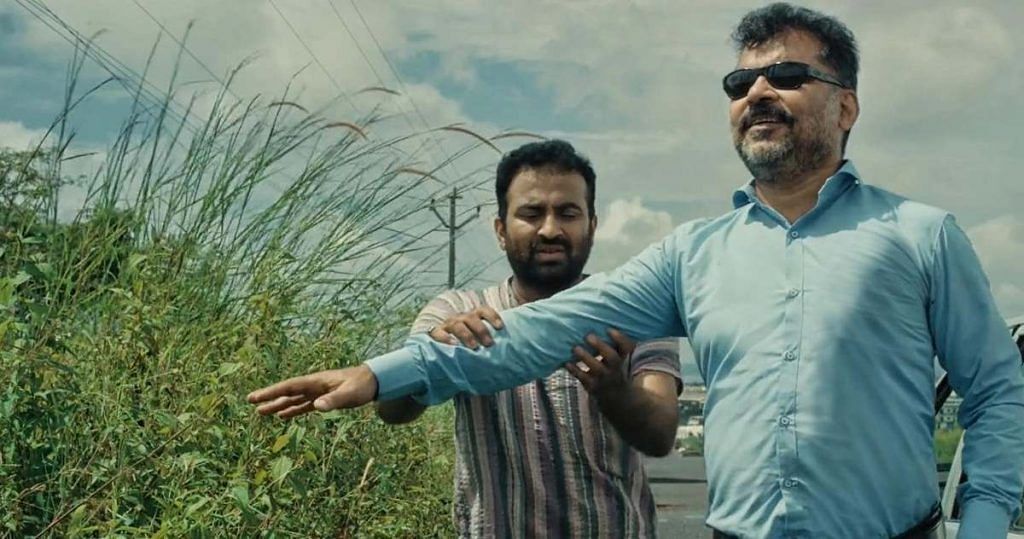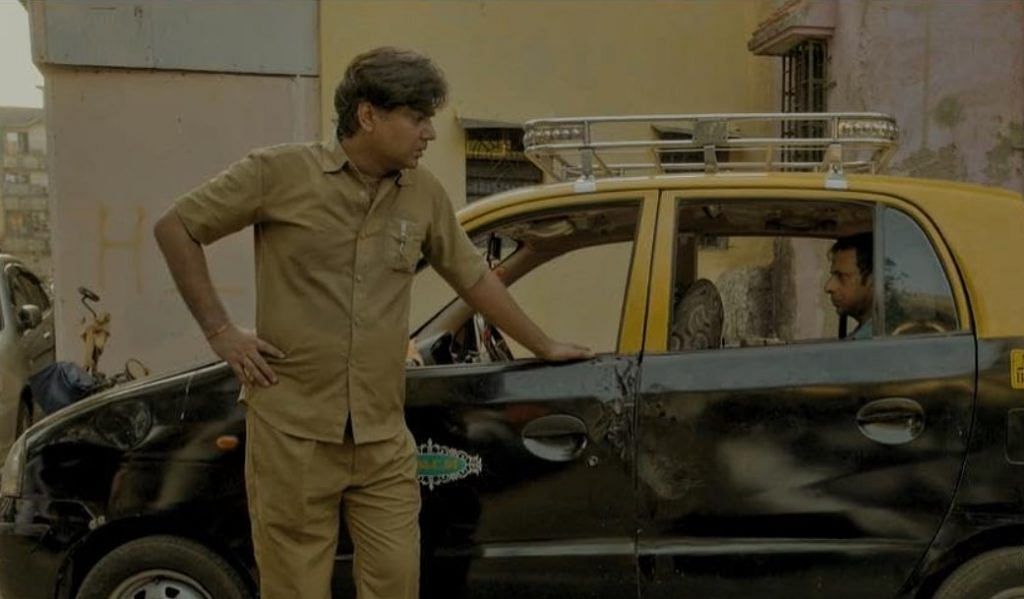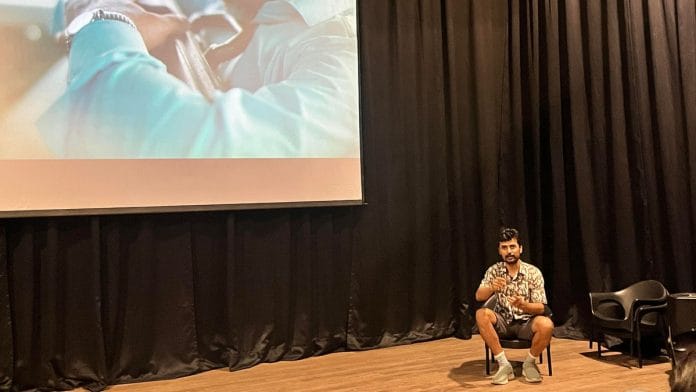New Delhi: Prejudice is a sticky, tangled web, and it can ensnare anyone, anytime. That’s the hard reality check Mumbai-based filmmaker, screenwriter, actor, and stage lighting designer Asmit Pathare delivers through his two short films, Two Way Street and Escort, part of an ambitious anthology examining prejudice in contemporary Indian society.
Screened last weekend on the concluding day of the Little Stint Performance Art Festival, presented by Odd Bird Foundation and W.I.P. Labs, these shorts have already garnered international attention. Two-Way Street made it to the Oscar-qualifying race and Escort won Best Screenplay at the 2023 Venice Shorts competition. But Pathare is still looking for funding to make the remaining two films and pitch the entire anthology to OTT platforms. Until then, film festivals are the only avenue for reaching audiences.
Two-Way Street (22 minutes) delves into the everyday nuances of communalism through the interactions between a Hindu driver and a Muslim passenger. When the driver refuses to enter a Muslim neighbourhood in Mumbai, it sparks a psychological duel between the two, with the passenger resisting being cowed down by bias. Escort (27 minutes) tackles both ableism and class prejudice. It explores the dynamics between a blind social worker and his escort/driver, where privilege shifts depending on the situation.

While prejudice is a multilayered and perennial problem, Pathare said that the media, state, and governmental policies together shape the forms of bigotry that become most pervasive and visible. Consequently, he doesn’t want to be limited to only those prejudices that are currently in the spotlight, but also look at the subject through the lens of gender and caste in the remaining two short films.
“Since 2014, religious prejudice has been at the top of all prejudices. It’s the most important discriminating factor that is polarising society currently,” said 40-year-old Pathare, who has been in the film and theatre circuit for 18 years. But when the Congress was in power, he added, it perpetuated a class divide. “After 2014, the BJP took advantage of that,” he said.
Also Read: Bastar to Article 370—Bollywood propaganda movies boosting BJP soft power
‘Form is secondary, politics is first’
The perpetrators of prejudice don’t automatically become villains in Pathare’s films, retaining their humanity even as they enact their biases.
Pathare strategically employs both space and silence in both films. It was his way of countering a world where the viewer doesn’t often get time to process the deluge of information coming at them.
“These are delicate films,” he said. “There’s nothing happening on a grand scale (in the films), nothing that will destroy the world. It’s only about a person’s dignity and identity. So, I wanted to leave those blank spaces wherever a dramatic moment happens. You allow the audience to process it.”
The haunting silence in the final scene of Two Way Street exemplifies this. The two protagonists are shown in separate frames, each contemplating their fraught interaction. This silence allows the audience to contemplate the characters’ experiences and thoughts too.

Pathare’s films feature flawed protagonists, not caricatures. Whether it’s the driver and passenger, or the blind man (loosely based on Pathare’s father) and his escort, each short film establishes the characters’ own universes that extend beyond what’s shown on screen.
“People who are full of biases also have a human side to them. They are pretty human to their people also,” Pathare said.
Escort, especially, subverts expectations. Pathare doesn’t portray the usual helplessness one might associate with a disabled person. Instead, he reverses the dynamics and shows the blind man as the privileged person—in terms of education and class—compared to his escort, who drives and takes him around. He takes this “crazy dichotomy” forward by making the escort more privileged than his boss when demonetisation hits, by virtue of being visually abled.
“This also makes stories balanced. They are not one-sided stories” said Pathare.
Meaningful storytelling is at the heart of Pathare’s work, even overriding aesthetics for him. He acknowledged that the latter held priority in his initial years of learning, but over time he grew to believe that “form is secondary, politics is first”.
Also Read: Why’s Bollywood obsessed with Vijay Mallya? Neeyat, Crew tap into a lingering fantasy
Prejudice and propaganda
Two Way Street is a film with a purpose. Through its character arcs and nuanced interactions, the film prompts viewers to confront their own potential religious biases.
In his adaptation of a script by writer Annie Zaidi, Pathare wanted to develop the driver’s character to show not just “selective humanity” but also the possibility of a conversation.
Despite his bias, the driver avoids misbehaving with the Muslim passenger and eventually drops the man to his destination. Later, the driver is shown looking up from a plate of untouched food. This, to Pathare, symbolises “acceptance of guilt”— it’s not a dramatic change of heart, but it’s good enough.
If the driver had been portrayed as a villain, Pathare said, the message wouldn’t have resonated with the audience. It wouldn’t have made them question their own biases. “I want to appeal to their humanity,” he added. “If you are a prejudiced person, if you are already biased toward an identity, I need to understand where your bias is coming from. Because bias always comes from insecurity.”
Pathare himself developed Zaidi’s original 10-minute script, which he received many years ago. During the pandemic, he expanded it with more dialogue and scenes. The film carefully establishes a Mumbai setting that feels crowded to the Muslim protagonist, who is in the process of relocating back to the city. The film quietly highlights a more corrosive change than just an increasing number of people— the seeping in of religious prejudice.
The nameless protagonists are part of a vicious cycle of prejudice that Pathare attributes to the media and state machinery. The Muslim man is naturally “disheartened” and questions the differential treatment he is experiencing in his city. But Pathare is careful to not portray the driver as somebody “who has lived with this prejudice”. He frames him as a “victim of propaganda”.
No career in short films?
Despite his passion for short films, Pathare said he sees them more as a stepping stone to directing feature-length films. There’s not much of a market for them and funds are scarce.
“Now, even anthologies are dying. No OTT platforms are taking anthologies” said Pathare, who recently also acted in Fairy Folk (2024).
For both Escort and Two Way Street, he claimed, the producers provided only 50 per cent of the needed funds, which covered production costs and logistics. The actors were paid nothing. Pathare said no one wants to give money for short films.
“People are not sure about the life of a short film, the longevity of it, what it is going to bring to them,” he said. “Therefore, finding actors also becomes difficult.”
Thanks to his “social capital because of working in theatre” Pathare was able to cast established names for his two projects—Joy Sengupta and Gagandev Riar for Two Way Street and Ajeet Singh Palawat and Danish Husain for Escort.
Beyond funding issues, Pathare is concerned about the shadow of government censorship over OTT content, thus further shrinking the visibility of short films that go against the grain. Such films are often relegated to “indie circuits”, which are “not commercially viable spaces”, he said. “You can’t make a living out of making films.”
(Edited by Asavari Singh)






